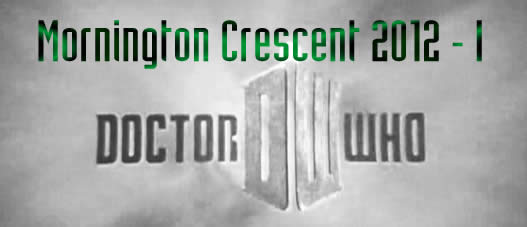

The TARDIS was parked in front of a building that could easily have been in ancient Egypt if it hadn’t been for the twentieth century windows, the railings outside and the ‘taxis only’ parking space in front. The huge pillars rising up four whole floors of the building, painted in subtle, earthy colours at the base and the crown, and the graceful cat sculptures guarding the main door were unmistakeably Egyptian in style.
“It’s Art Deco, isn’t it,” Jean said, looking up at the building. “Or is it post-modern?”
“It used to be a cigarette factory,” The Doctor told her. “The cats were the logo on the packets.”
“Not exactly a noble purpose. But it’s definitely impressive. Are we in London?”
She turned from the building that The Doctor had identified as the former Carrares Cigarette Factory and noted a red number 88 Bus going to Clapham Common and a row of blue and black bicycles for hire - part of the Mayor’s plan to get people out of their cars and going to work healthy.
“Yes, we’re in London,” Jean answered herself. “More or less in my time, too. So why are we here? Is there an alien invasion due?”
“No, it’s just Mornington Crescent.”
“Mornington Crescent?” The phrase seemed vaguely familiar but Jean couldn’t remember why.
“It is the name of the underground station a short walk up the road from here,” The Doctor explained. “It is a perfectly ordinary place, made famous on a radio comedy show in the 1970s, from which it came to the notice of Lord Arthur Sweetwell, who named the annual Time Traveller’s Scavenger Hunt after the place.”
“The WHAT?” Jean was fast reaching the point where she got irritated by her role as dumb apprentice to The Doctor, always asking the questions and not always getting the answers.
“There are, despite the best efforts of my people to put a stop to it, quite a few species that have time travel capability of some kind. Humans from the fiftieth century onwards had some limited technology. They created the Time Agency to licence and police those who used it. Lord Arthur was the inventor of the Vortex Manipulator used by agents. He retired to the twentieth century for peace and quiet and created the game as a way of using time travel for fun. It started in the early 1970s with just three competitors – a young Time Lord called Alexandro Heddin, a Parominal called Ingenia and one of Lord Arthur’s old colleagues from the Agency. The following year there were a dozen entrants, including two Time Lords – me and my old friend The Corsair. My people were always a bit suspicious and insisted on keeping an eye on things. This year, I believe there are as many as fourteen teams or individuals, but only the one Time Lord.”
“You?”
“Me.”
“Ok. So… scavenger hunt… it’s like a treasure hunt kind of thing, following clues?”
“Exactly. Our first clue will be given to us at the station. We’ll meet Sir Arthur there.”
Jean was philosophical. It could be fun. At least it sounded as if nothing would be trying to eat them.
The Doctor quickened his pace, crossing the road without looking and miraculously managing not to get run over by a London bus or cause a crash as motorists swerved to avoid him. Jean pressed the button at the pelican crossing and waited until it was safe to catch him up.
When she did he was outside a building faced with deep red ceramic tiles and the words ‘Mornington Crescent Station’ on a strip of white tiles just under the eaves. There were three people with him. Jean recognised them from several chance meetings even before he announced joyfully that it was ‘The Ponds’.
“I’m not a Pond,” Rory Williams protested. “Neither is Amy. She’s married to me. And technically, neither is River, since she’s our daughter and we were married before she was born.”
“I can’t call you the Williamseseses,” The Doctor answered. “I never know when to stop saying it. Ponds is easier. What are you doing here?”
“River asked us to come with her on a sort of… game… a quest… a scavenger hunt,” Amy explained. River smiled and held up her wrist. She still had the vortex manipulator she acquired in goodness knows what future century from goodness knows where. It would easily take the three of them anywhere and anytime the Mornington Crescent Scavenger Hunt might direct them.
“So we’re competing against your team?” Jean concluded. “That could be interesting.”
“We could always join up and work together,” River suggested with a sultry glance at The Doctor.
“No,” Rory protested. “No, we said we’d come along with you, but jumping on The Doctor’s bandwagon always leads to trouble. We’ll… get together for coffee after it’s over and swap stories. But until then, we’re the opposition.”
“May the best team win,” The Doctor said with a grin that implied he and Jean WERE the best team.
“Don’t get over-confident, sweetie,” River told him. “How many times have you competed? And how many times have you lost?”
“I don’t call it losing,” The Doctor answered. “The experience of taking part is a prize all of its own.”
“You keep telling yourself that, lover,” River countered before she turned and headed into the station. Rory and Amy waved goodbye to Jean and followed her. The Doctor deliberately waited several minutes, watching a tall thin man and a short, fat one go through the turnstile and down the escalator before he took a pair of London Underground tickets out of his pocket and passed one to Jean. She noted that it was a single ticket from Mornington Crescent to Mornington Crescent, which was the level of silliness she had come to expect from any venture involving The Doctor.
She followed The Doctor down the escalator to the platform level and through the crowd waiting for the next train. She was only slightly surprised that The Doctor wasn’t planning to get on a train. Instead he headed for what looked like a section of tiled wall near the tunnel exit.
“Oh, don’t tell me, platform nine and three-quarters,” Jean commented as The Doctor disappeared through the wall. She followed him, prepared to see just about anything, including an old locomotive with steam up.
She found herself in a rather old fashioned but comfy drawing room where a man who looked like a cross between an elderly member of the House of Lords and Jimmy Savile waited. The Doctor greeted him like an old acquaintance.
“How many times is it now, Doctor?” asked Lord Arthur Sweetwell. “Twelve, thirteen?”
“Eleven,” he responded. “Not counting 1981 when it was a ten way dead heat and 1987 when Rachida Bowtwist kidnapped my companion and I lost out because I had to rescue her.”
“Kidnapping isn’t exactly playing the game,” Lord Sweetwell agreed. “Though I never made an official rule about it. Anyway, good luck, old man. You’re the last of them. Twelve teams and individuals this year. Watch out for that River Song. I’ve heard rumours about her. She’s a crafty one.”
“Oh, don’t worry, I can handle her,” The Doctor replied, taking the gold-edged envelope handed to him. He grinned widely and turned to leave. Jean took one more look around the curious room and then followed him out again. He went straight back up the escalator and out into the street. He kept walking in his purposeful way, hardly noticing any of the other pedestrians yet somehow managing not to bump into any of them until they reached the TARDIS beside the black cats of the old cigarette factory again.
“So what’s the first clue?” Jean asked when The Doctor finally opened the envelope and pulled out the sheet of gold edged paper inside.
“Pull a rod out of the conflagration of government,” he answered. He turned the sheet over to see if it said anything else. He held it up to the light to see if there was any sort of watermark and shone the sonic screwdriver over it to see if it revealed any invisible writing.
“That’s it?” Jean asked. “What does it mean?”
“We’re supposed to work that out for ourselves. It’s a cryptic clue. Rod… fishing rod, divining rod, Rod Hull…? No, that’s silly. Lightning rod? Yes, that might be right. It goes with conflagration. But then how does government fit in with that? I mean, I’ve heard some heated discussions in the Gallifreyan High Council. But none of them actually conflagrated…. Actually, I’m not even sure that’s a word.”
“Conflagration… fire,” Jean considered. “Government… democracy… parliament….” There was a long silence. The Doctor looked as puzzled as she was. Then she went to the TARDIS database and typed a couple of keywords into it. She laughed softly.
“What?” The Doctor looked faintly annoyed.
“In 1834, the Palace of Westminster… the Houses of Parliament here in London, burned down. Conflagration of Government?”
The Doctor moved around and noticed that she was looking at a Wikipedia page. He made a scornful noise. All of his intellect and experience surely wasn’t going to be outdone by something as mundane as that.
“No, it can’t be,” he said. “How do you pull a rod out of a burning building?”
Jean looked uncertain for a minute. Perhaps The Doctor was right. Then she read a little further down the Wikipedia article and grinned triumphantly. “Set your co-ordinates for October 16th, 1834, around about four-thirty or so, before the housekeeper locked the House of Lords chamber. A ROD is an old-fashioned measure of length here on Earth. And on that afternoon the Elmwood tally sticks used by the Treasury officials for ensuring correct weights and measures were being burnt in the furnace below the Chamber. That’s what caused the fire that burnt nearly the whole of the Old Palace of Westminster.”
The Doctor’s expression was inscrutable, but Jean suspected that he was sulking because she had worked it out faster than he had.
He shrugged and set the co-ordinate.
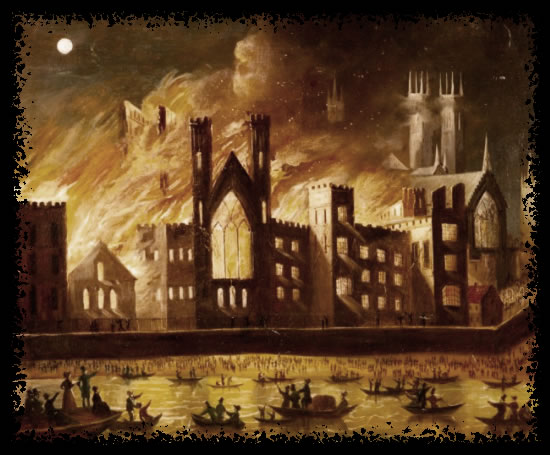
“Find ananas comosus aurum at Wren’s largest parish church.” River read out the clue to her bewildered parents when they were outside the station. “Wren….”
“That must be Sir Christopher Wren, and it must mean St. Pauls,” Rory suggested.
“St. Paul’s isn’t a parish church,” Amy answered him. “It’s a cathedral. Didn’t he build a whole load of churches in London after the great fire? We need to find out which is the biggest of them.”
“Ok,” River decided. “That’s probably easy enough. We just need to do a search for Wren churches. But what is ananas comosus aurum?”
“It’s….” Rory held up his hand to his forehead as he thought it through.
“You know Latin?” Amy had worked out the language but had no idea what the words meant.
“I know Latin words for medicines,” he answered. “And I know aurum is gold…. Because the chemical symbol for it is AU. But ananas… fruit salad….”
“What?” Amy and River both looked at him curiously.
“Tinned fruit salad. We feed it to the geriatric patients with evaporated milk… for supper. It comes in huge catering tins. I’ve seen that word on the list of ingredients. It’s a fruit.”
“Banana?” Amy suggested. “It’s got some of the letters in it.” She had done a Google search on her Blackberry and found that Wren’s largest parish church was St. Andrew’s in Holborn while they were puzzling over the contents of hospital desserts.
No, there aren’t any bananas in the fruit salad,” Rory answered. “There would be a riot if there was. The old ladies are always moaning about who got more cherries in their bowl. Bananas would be a fruit too many.”
“It’s pineapple,” River said. She had turned to her vortex manipulator and used the translation function. “We’re looking for a golden pineapple at the parish church of St Andrew’s, Holborn.”
“And that’s supposed to make sense?” Amy asked.
River started to programme co-ordinates into the Vortex Manipulator. Rory shook his head and consulted the map of the London Underground.
“It’s only a couple of miles. We don’t need to scramble our heads to get there.”
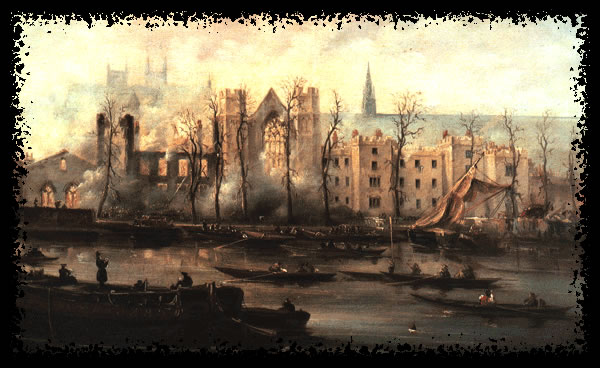
The Doctor and Jean stood on the embankment opposite the Palace of Westminster and watched as the very newly formed London Fire Brigade struggled to save at least part of the ancient building that had gone up in flames. They weren’t the only people to be out there watching the biggest conflagration in the city since the Great Fire of 1666. The Prime Minister himself, Lord Melbourne, gazed at the sight and calculated the cost of rebuilding the seat of democracy. Charles Dickens, an up and coming essayist with a sharp mind for details about such things, was there, too, and would later pen some acerbic words about the folly of those who let the fire start.
The Doctor was holding a slightly scorched tally stick in one hand. Nobody seemed to think that was an odd thing to be holding at all. Jean was trying not to think about how hot and smoky the ante room was when the TARDIS materialised in it, or the hellish glow from the furnace when The Doctor went in and grabbed the stick from the flames. The whole thing had taken only a few minutes, but it seemed a lot longer.
The stick was a half-rod – but that was still taller than he was at a bit more than two and a half yards. It was only an inch thick and wobbled as he planted it on the ground by his feet. Dressed as he was, in his usual outfit that belonged to no known time period, and carrying such an object it was amazing that he wasn’t the subject of speculation. The fire was obviously a more interesting matter.
“Let’s get out of here,” Jean said. “We have what we came for, and you said we weren’t allowed to interfere with the fire itself.”
“Yes,” The Doctor agreed. “We should do that.”
Nobody had noticed the TARDIS parked up on what would be known as Albert Walk in future time when Albert had any number of things named after him at Victoria’s command. They didn’t notice it disappear.
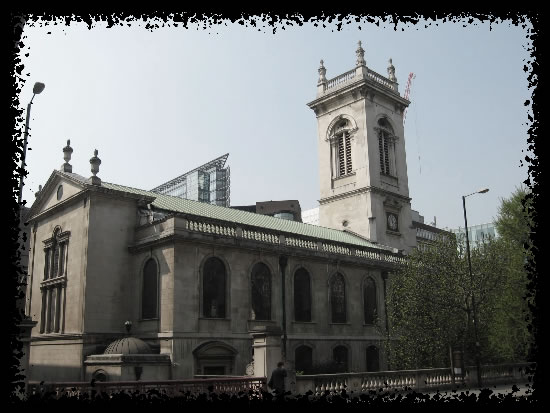
Team Pond – or possibly Team Williams – arrived at St. Andrews Parish Church, Holborn by way of the London Underground, taking somewhat longer than a Vortex Manipulator and involving rather more noise and crowds, but slightly less nausea and headaches.
Their next problem was finding a pineapple.
“THERE,” Amy said as they walked around the outside of the church looking for any sign of exotic fruit. She pointed to the wrought iron railings around the outer wall. They were black except for the decorative tops which were mostly spear shaped apart from a pineapple every half dozen railings along.
They were painted gold.
“Ananas comosus aurum,” River and Rory both chorused.
“We’re going to have to cut one of those off to take with us?” Amy queried. “Metal theft is a serious crime these days.”
“We’ll bring it back,” River promised. “That’s always the way on the Mornington Crescent Scavanger Hunt. Anything taken gets put back as good as new.”
She reached in her pocket for a small but powerful laser cutting tool. Neither Amy nor Rory wanted to know where she got it from, but they had no doubt it would slice through wrought iron in seconds.
“Wait a minute,” Rory cautioned her. “I’m not sure about this. Are these the RIGHT pineapples. I mean, the church is hundreds of years old. But these railings…. Didn’t iron railings get melted down for munitions in the war?”
River looked closely at the pineapples and concluded that there were no messages on any of them as they had fully expected to find.
While she was looking a door opened and a curate in his black clothes and collar stepped out. He looked at the three loiterers and decided they looked too respectable to be vandals. River hid the laser cutter in her pocket again and tried not to look guilty as he asked if they were here to see over the church.
“We’re… interested in these pineapples,” Amy said. “It’s a street architecture thing. Do you know… first of all, WHY pineapples? And… how old are these particular ones?”
“Ah, that’s quite easy,” the curate answered. “The pineapple was first brought to England from the Americas in the seventeenth century and became known as a symbol of hospitality and welcome because they were given as gifts by the natives of the New World. What could be more hospitable than a church, after all? As for the age of these… they were put here in the 1950s. The original ironwork was commandeered for the war effort in 1939.”
“Ah, of course,” Amy said. “Now I understand. Thank you very much.”
“Have you looked at our statues of the bluecoat boy and girl around the other side?” the curate asked. “They are quite charming.”
“We’ll take a look at them in a minute,” Amy said. “When we’re done with the railings.”
The curate looked a little puzzled. After all, how much attention could three people give to ironmongery? But he bid them a pleasant day and went on with his own business. Amy and Rory turned to River questioningly. She was adjusting her Vortex Manipulator.
“1939,” she said. “Here we come.”
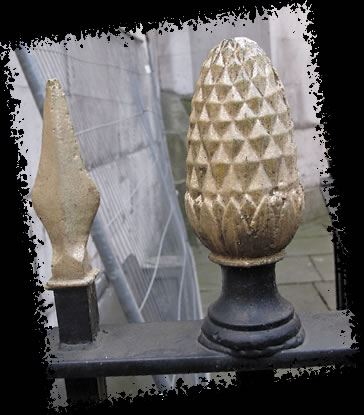
“Find a flying fish in Billingsgate,” The Doctor said, reading the lettering on the edge of the scorched rod. “Flying fish? The only place fish fly is the planet Ember. I had a really interesting Christmas with a shark there….” He stopped reminiscing and got back to the point. “At Billingsgate the fish are usually on a slab.”
“We’d better go and have a look,” Jean suggested. “Maybe it will make sense when we get there.”
The Doctor knew she was right. He set the TARDIS co-ordinates for Billingsgate market in the twenty-first century, if for no other reason than so that Jean could change into something more her style before they went on a fish hunt.
The Ponds weren’t using first class time travel. They had to live with the clothes they had. In anticipation of visiting past times, Amy had adopted a longer skirt than usual, but she still felt a little bit self conscious in the autumn of 1939 in her modern outfit. She wished The Doctor was there. Somehow he managed to project an aura that made people forget about things like fashion. She had worn a nightie and dressing gown on Starship UK and met Queen Elizabeth 10th with her hair full of whale sick. She had wandered the corridors of Winston Churchill’s underground war rooms in a denim mini skirt and leather jacket. With The Doctor, things like that were ok. But she wasn’t so certain, now.
“Look,” Rory said. “They’re dismantling the railings.”
She looked. Two men were using hacksaws to cut through the wrought iron and pile sections of the fence onto a flatbed lorry. The pineapples were on top of a whole section of spears.
“We’ll distract them while you grab one,” River said.
“We?” Rory questioned. “You mean… you and Amy?”
He wasn’t sure which disturbed him more – his wife or his daughter using feminine wiles on two workmen. He felt as if he ought to assert his authority and forbid them both.
But he knew that his authority over them wasn’t as strong as it ought to be.
And besides, it was the only plan he could think of, unless HE distracted them, and that depended on the workmen having secret proclivities he didn’t want to know about.
The women sidled up to the men and engaged them in conversation. Rory didn’t want to know what it was about.
It worked, though. He heaved a length of iron with a pineapple on top off the pile and carried it around the corner as quickly as he could. He hid it behind his back and waited for Amy and River to join him.
“This thing weighs a ton,” he complained. “We need to take it home and leave it there before we go after the next clue. We can’t drag it around with us.”
“We’ll take it back to Mornington Crescent and put it in a left luggage locker,” River decided. “After we’ve looked at the clue and worked out where we’re going next.”
“We’re going round the BEND,” Rory complained. He spun the heavy length of iron with its golden pineapple around slowly and read the lettering etched on the lower segments of the faux fruit.
“Borrow a book from Miss Durning’s Library,” he said.
“Well, at least that sounds a little more LEGAL than stealing fence posts,” Amy commented before River operated the Vortex Manipulator and all three of them left the scene of the crime in a wink of sudden bright light that was gone before any witness could comment about it.
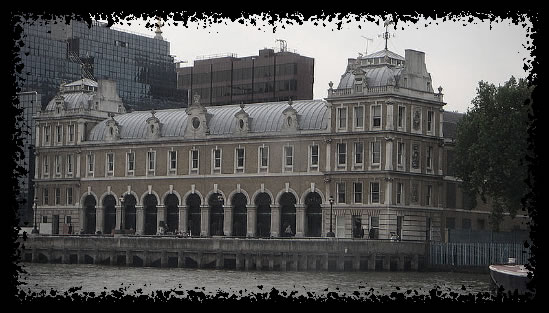
Billingsgate Market, the original nineteenth century arcade in elaborate Italianate style, that was used right up to 1981, did, indeed, have just about every kind of edible fish that any gourmet could desire with everything from North Sea cod to exotic swordfish for sale.
But nothing was flying. Every fish that The Doctor and Jean looked at had been dead for several hours, packed in ice to keep it fresh for eating.
“Fish are one of the most amazing species in the galaxy,” The Doctor commented as they came out of the market with its overwhelming smell of – well, fish, and wandered by the Thames watching the deliveries of more fish off barges that tied up at the Billingsgate wharf. “Countless varieties have evolved on every planet with surface water, even some that don’t. The fish that swim in the subterranean oceans of Limba Gamma are amazing. They actually generate their own light within their bodies.”
“Some deep ocean fish on Earth do that,” Jean pointed out. “It’s not just an alien thing. But where is the flying…. Oh….”
She had looked up at the roof of the building, to demonstrate that on Earth, in Britain at least, fish didn’t fly.
And she spotted a flying fish.
Well, actually, it was a gilded weathervane that reflected the sunlight as it swayed in a variable breeze, but it was fish-shaped and it looked as if it was flying.
“But how the heck do we get THAT from up there?” Jean asked.
The Doctor gave her a look that was easy to interpret.
“How do we get it LEGALLY?” she amended.
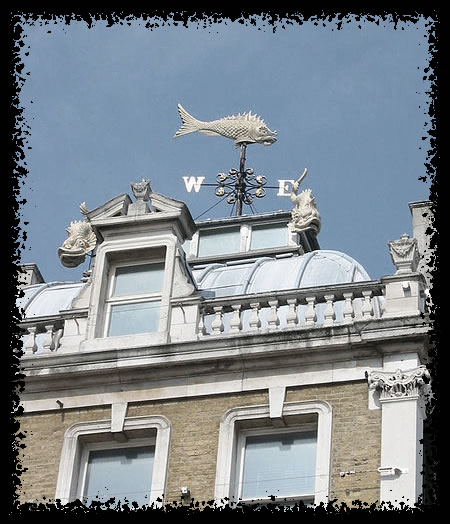
“Ok, this is the place,” Amy said as they walked along Kennington Road in the Borough of Lambeth in the year 1889. She was still feeling out of place in her modern clothes, but she was starting to feel as if she had some of that confidence The Doctor had when he wandered around in historical times without any consideration of proper fashions. Perhaps it could work for ordinary mortals after all.
“The Durning Library.” Rory looked up at the carved lettering above the red brick and white stone arches of the ground floor. The building was gothic style gone into overdrive, standing out l from the ordinary London terrace either side. Somebody intended for this small but distinctive building to be noticed.
“According to Wikipedia it was founded by a lady called Jemima Durning-Smith, to provide free books to the poor,” Amy explained. “Nice lady, heck of a mouthful of a name. It’s still going in our time, in this exact same building, only the shops around it are a bit scraggier.”
“So let’s go borrow a book,” River said.
“What book?” Amy wondered as they looked around the quiet, calm library with the faint smell of paper and leather bindings that went with any library old or new.
“Any book,” Rory said. “I don’t suppose it matters.”
“THAT book,” River decided, pulling a volume from a shelf of contemporary literature. “This is the one we were meant to borrow.”
“How do you know?” Amy asked.
“Because this is the year 1889, when this library opened. And this is a First Edition copy of H.G. Wells’ Time Machine – first published in 1895. It doesn’t belong here anymore than we do.”
“Sounds right to me,” Amy agreed. “But even if it is a plant, let’s not just steal it. I’m still worried about the pineapple. Rory, go and fill in a form and become a member.”
Rory went to the big, old-fashioned desk where an old fashioned librarian – a middle-aged spinster with a no-nonsense look about her - sat patiently. He filled in the ticket, putting a fake address on it and noting that there was no requirement to supply a phone number, and certainly not a mobile or email address as he was accustomed to putting on the forms he filled in during the rare days of normal life he occasionally lived. He didn’t need to supply multiple forms of photo ID, either. He was duly enrolled in the Durning library and permitted to take up to three books out at once. The librarian stamped the sheet stuck inside the copy of Time Machine and handed it to him.
“Enjoy the book,” she said to him. “Remember to bring it back before the last day or there will be a fine of a halfpenny per day.”
“Yes, ma’am,” Rory answered politely. He headed for the door followed by Amy and River. Outside they paused to look at their acquisition more closely.
“Here,” River said. “On the back flyleaf. I think this is it. The funny thing is, I’m sure that’s Herbert’s own handwriting.”
“And you’d know because….” Amy questioned her daughter, who gave a sly smile and refused to say any more. They all read the clue instead of speculating about River’s love life.

They didn’t even try getting the fish until after dark, when the market was shut and the streets of London were relatively quiet. The Doctor brought the TARDIS in hover mode over the roof of the building and stopped above the weather vane. Jean watched in amusement as he leaned out of the doorway and used the sonic screwdriver to detach the fish from its nest before bringing it back into the TARDIS. Below in the street there was still a little late night traffic, but nobody was looking up at the roof, and if they did, they would probably think they were seeing things. Old-fashioned police boxes didn’t hover over buildings with lunatics hanging out of them stealing weather vanes.
“I’ll put it right back when we’re done,” The Doctor promised as he scrambled to his feet clutching the metal fish.
“Ugly looking thing, isn’t it,” Jean commented. The sculpture was a curiously spiny affair with a rather angry looking open mouthed expression.
“I’m sure it’s very attractive to other fish,” The Doctor replied. “You really shouldn’t be so judgemental, Jean.”
“It’s a metal fish. I doubt I’ve hurt its feelings,” Jean answered. “Does it have anything to say for itself?”
“See the light between fine art and science,” The Doctor told her. “It’s written on its tongue in very small characters. It really is amazing where they hide these clues.”
“Absolutely amazing,” Jean commented. “So what does it mean? Some kind of museum or art gallery?”
“No,” The Doctor said with a satisfied gleam in his eye and a wide, wide grin. “I know exactly where this is. I was at the opening ceremony in 1869. Victoria was there. It rained a bit, but they put up an awning for the royal party.”
Jean knew this anecdote would go on for a long time if she let it. She reminded The Doctor that this was a race as well as a trip down memory lane and they had plenty of eager competition.
“Yes, I wonder how the Ponds are doing,” he remarked as he set the next co-ordinate in space and time.
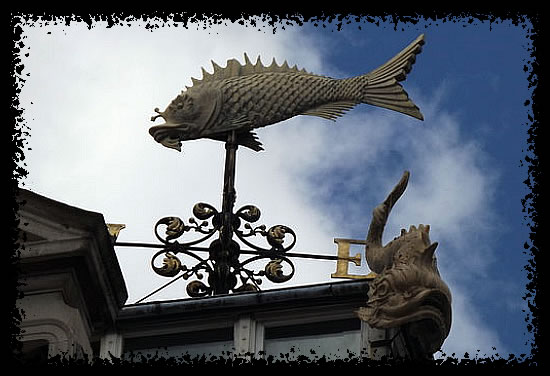
“Winston’s Cigar,” Rory looked at the clue. He turned the book around to see if it spelt something upside down. He even got out a pencil and tried anagrams. “Is it a brand name or something? I don’t know. I’ve never smoked….”
“Yes, you have. When you were fifteen and trying to be cool behind the sports pavilion,” Amy told him. “This one is obvious.”
“Is it?” Rory still looked blank. But he had made the phrase ‘acorn swigs tin’ from the letters.
“Winston Churchill,” River pointed out. “Can you think of any other Winston in history who smokes cigars.”
“Oh, yeah, right.” Rory stopped doing anagrams. “In that case I think I know where we should go. I saw it on TV when I was on the night shift. You’d be amazed what you can learn on the subtitled programming at three o’clock in the morning.”
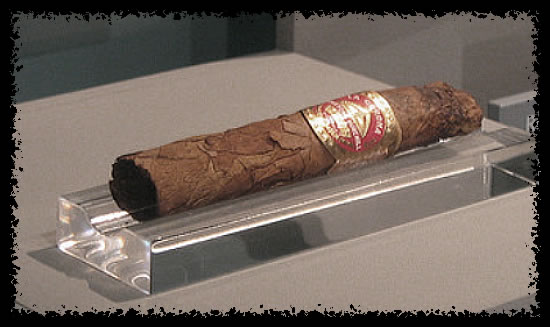
It was a year after the opening ceremony. The queen and all the VIP dignitaries were long gone. Holborn Viaduct was quiet. It was nearly midnight and the last train had already crossed the elegant iron bridge that crossed the valley of the old River Fleet and connected north-west London with the City.
The Victorians built viaducts with style, Jean noted as she followed The Doctor along the side of the quiet rails. There were statues either side of the bridge – winged lions on four pediments and between them classical representatives of commerce and agriculture and fine art and science.
Between the statues were electric lamps on slender wrought iron posts.
“Electric? Isn’t the city still mostly gas-lit?” Jean queried. “This is only 1870, didn’t you say?”
“Holborn viaduct was one of the first places in London where electric lighting was installed,” The Doctor explained. “There’s a steam powered turbine down below where the electricity is generated.”
Jean was digesting that piece of historical information when The Doctor shinned up the lamppost between ‘Fine Art’ and ‘Science’ and dismantled the glass globe. He carefully unscrewed the bulb using his handkerchief to prevent his fingers getting burnt. He replaced it with one from his pocket and re-assembled the globe. Jean looked up and down the railway line hoping that nobody saw him. She wasn’t sure how illegal it was to remove bulbs from a public light, but they were already trespassing on the line. They would be definitely in trouble if they were spotted.
They weren’t spotted, but it was a near thing. A policeman passed under the bridge on Farringdon Street, casting a familiar helmeted shadow in the light of the new bulb. He was gone by the time Jean and The Doctor reached the street level. They paused in the same lamplight to look at the liberated bulb now that it had cooled down a little.
It didn’t look very much different from a modern light bulb except it was a screw fitting rather than the more familiar bayonet and there was a rough tip of left over glass on the top from when it was blown.
“Tell me you didn’t put a modern halogen bulb into that lamp,” Jean said. “You’ll blow the whole thing.”
“As if I’d be that daft,” The Doctor answered in the face of all evidence to the contrary. “This is a Swann bulb, designed by Joseph Swann who developed the light bulb in Britain. I replaced it by an Edison light as invented by his American counterpart. Actually, it’s Edison’s FIRST working light bulb. He gave it to me as a memento after I sat up late helping him experiment with different filaments. I’ll swap it back after the quest is over. I don’t really want to part with it.”
Jean decided that had to be another tall story and turned the bulb around slowly to find the very tiny letters etched in the glass that pointed them to the next stage in their quest.
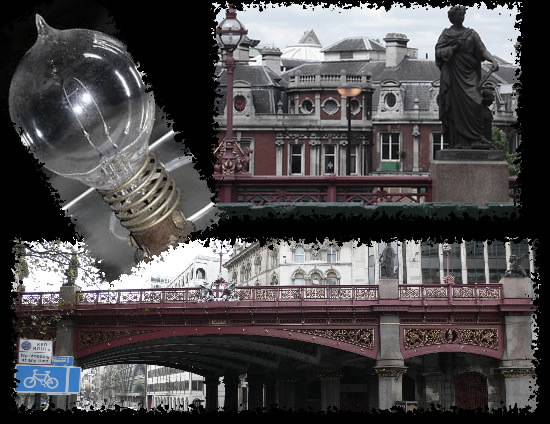
The Ponds (or Williams) paid their entry fee and took the stairs down into one of London’s most obscure tourist attractions, Churchill’s War Rooms. They walked around the reconstruction of the claustrophobic underground base where the Prime Minister and his cabinet had sat during the Blitz and the work of fighting the Nazi threat had been co-ordinated. To most tourists it was interesting stuff, but the Ponds weren’t MOST tourists.
Amy was especially disenchanted with it all. She looked at the fibre-glass mannequin of Winston Churchill at his desk critically and had only one comment worth voicing aloud.
“They made him too thin.”
“Modern people don’t think a grossly fat man could possibly have been a great leader,” Rory explained. “They slimmed him down a tad.”
“The whole thing is DUMBED down,” Amy pointed out. “And where are we supposed to find a cigar?”
“It should be right there,” River said, pointing to a large empty ashtray on the corner of the huge table-top map of the English Channel dotted with planes and ships representing the ongoing effort to prevent a German invasion. She showed her parents an image of the same table in the official brochure. In the picture there was a cigar on the edge of the ashtray.
“Do you think one of the other competitors beat us to it?” Rory asked.
“Could be,” River conceded.
“Could be people nick the cigar on a regular basis as a souvenir,” Amy suggested. “Besides, it’s papier-mâché. Everything here is. Surely we ought to be looking for a REAL cigar?”
“One of Winston Churchill’s ACTUAL cigars?” Rory laughed softly. “That’s impossible.”
“No it isn’t,” Amy replied. “River, lend me your vortex manipulator. Both of you stay put for a minute.”
“What are you going to do?” Rory asked as she strapped the gadget to her wrist. “Jump back in time and ask the Prime Minister for his cigar?”
Amy laughed and pressed the button. She vanished from the tourist attraction.
She timed it exactly right, landing in the REAL bunker with all that activity she remembered going on – ladies with radio headsets reporting the progress of a bombing raid over Germany while others shifted the model planes around. Churchill watched quietly, a fat cigar between his fat fingers, ready to light and the stub of the previous one in the ashtray on the corner of the table.
“Excuse me, Winston,” Amy said. “Could I have that, please?” She grasped the cigar from his hand. He was too surprised to object. “The Doctor sends his regards as always. He’ll probably drop in and see you some time.”
“I certainly hope so,” Winston Churchill answered. Then he shook his head as Amy disappeared in front of his eyes and called for one of his aides to get him another cigar.
“Easy as that,” Amy said to Rory and River when she returned to the museum. “Come on, let’s go. We’ve another clue to follow.”
“I wonder how The Doctor’s getting on,” Rory said as he looked at the next clue and wondered what kind of malevolent sociopath thought them up.
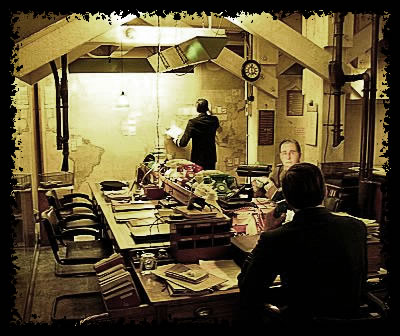
To Be Continued….
 |
 |
 |